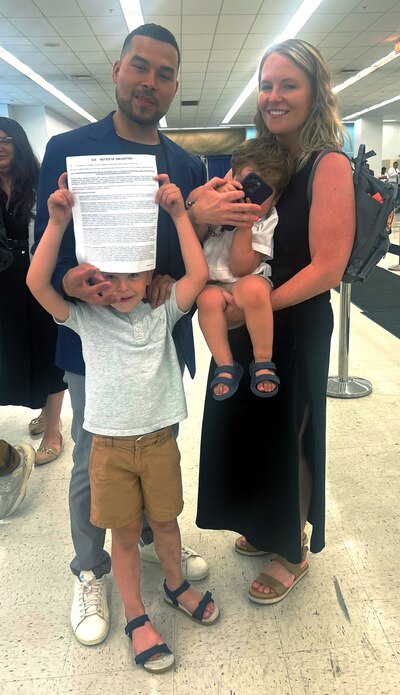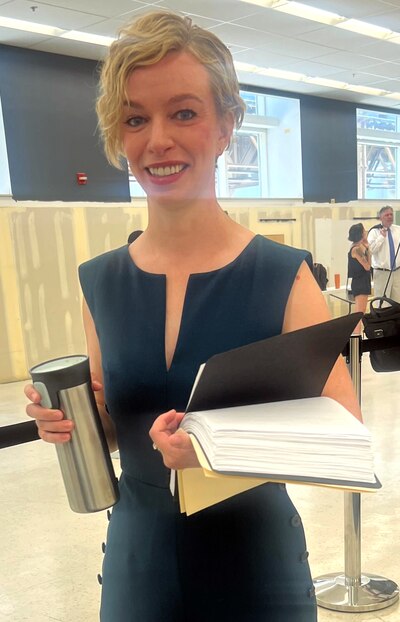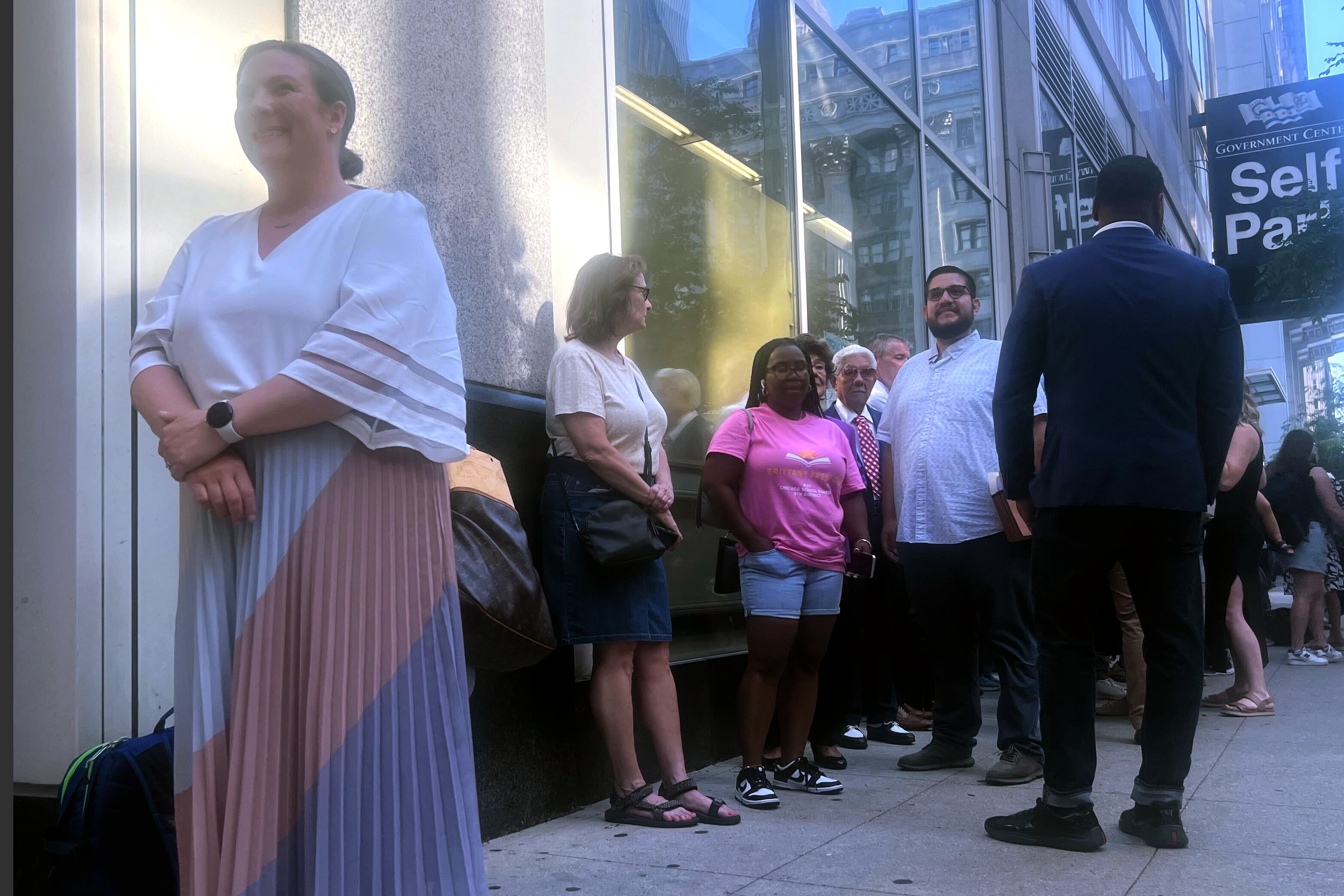Sign up for Chalkbeat Chicago’s free daily newsletter to keep up with the latest education news.
The hottest place to be in Chicago on Monday morning, it seemed, was a Board of Elections voting site, where residents hoping to run for the city’s first school board election started to line up an hour after sunrise.
By 8:15 a.m., at least two dozen hopeful candidates, their family members, and campaign representatives stood in 80-plus degree heat outside the Chicago Voting Supersite at 191 N. Clark.
They were waiting to file paperwork required to appear on the ballot for the Nov. 5 election. Those in line by 9 a.m. would be eligible for a lottery to appear first on the ballot in each of their districts.
Monday represented the first big deadline for the historic race. Candidates have until June 24 to file paperwork, which will decide who is running in each of the 10 districts up for grabs in November. Candidates are required to submit a notarized list of at least 1,000 signatures from voters in their districts who support their petition to run for office. They must also submit a statement of candidacy and a receipt for a statement of their economic interests. Candidates can also turn in an optional loyalty oath, in which the candidate commits to not overthrowing the government.
About three dozen people have filed paperwork indicating their interest in running in recent months. The new board, which will be sworn in in January, will for now have 10 elected seats and another 11 seats appointed by the mayor. Each district is split into two subdistricts; Mayor Brandon Johnson will appoint people from whichever subdistrict does not have a winner in the November election. The board will become a fully elected body in 2027.
Once doors opened around 8:30 a.m., the line of candidates filed inside, toward a line of tables where elections workers checked candidates’ documents and ensured they had gathered 1,000 signatures. Some members of the public, including representatives from Chicago Public Schools and the Chicago Teachers Union, watched from the sidelines.
People who lined up after 9 a.m. will fall in the middle of the ballot, while those who file by 4 p.m. on the final day to file – June 24 – will also be entered into a lottery to appear last.
Studies have not shown that ballot placement impacts voter behavior, said Max Bever, a spokesperson for the Board of Elections, but “it is Chicago tradition, especially for candidates to have a bit of pride to get to the top of the ballot.”
Kimberly Brown, a marketing professional and mother of two young boys, including a first grader at The Nettelhorst School, who is running for North Side District 4, was first in line at about 6:30 a.m., she said. Brown, who said she wants more transparency and equitable funding for schools, said she felt proud of the 2,600 signatures she and her team collected.
Brown, a first-time candidate, raised concerns about another element of filing petitions: the ability to challenge signatures people collect. Any registered voter living in a candidate’s district can file objections to signatures that candidates collect by July 1. Objections are often filed by candidates’ opponents.
Brown said her signatures are valid, but a challenge requires time and money to respond.
“Now, ballot challenges because of fraud? Totally OK. But just trying to kick people off the ballot or waste people’s time and resources, that to me is not OK and I am hoping we do not see that,” Brown said. “I am hoping that we see in this school board race what every Chicagoan wants to see, which is adults not fighting with each other and focusing on the real issue, which is children being more successful in our public schools.”
Like Brown, many people in line on Monday were running for public office for the first time. That includes Jason Dones, a former CPS teacher running in District 3 on the North Side. Asked why he decided to run, Dones said, “These guys,” pointing to his 6- and 2-year-old sons, who clung to both him and his wife. Dones’ older son, who attends Moos Elementary School, once told him that he works too much, so Dones brought him on Monday to include him in the process.

Another first-time candidate, Anthony Hargrove, who spent about 15 years as a dean at multiple CPS campuses and then several years at the central office, was second in line on Monday, and is running to represent the West Side neighborhoods of District 5. If he gets elected, one of his goals would be to boost reading and math scores among students in District 5.
The father of four said “it was a task” to collect roughly 2,000 signatures with the help of his wife and a couple of friends, all while tending to his day job as an associate director of the Back To Our Future program at nonprofit Breakthrough, which works with CPS to reach out-of-work, out-of-school youth.
“Every week I was at an event, I was knocking doors, I was going to senior buildings, I was at the grocery store, in the parking lot,” Hargrove said. “Just really getting to know my neighbors.”
Collecting signatures and launching a campaign has been “a whirlwind” for Jessica Biggs, a candidate in District 6 and former CPS teacher and principal who decided to run one month ago.

“I’ve been watching this process for many, many months and it was in mid-May that I really started paying attention to who was filing in District 6, and I didn’t feel confident that there was a candidate yet in District 6 that I wanted representing my child and my family on the board,” Biggs said.
Biggs ultimately collected just over 1,600 signatures, which she double-checked at the Board of Elections to ensure the petition signers were registered voters, she said.
At least one person in line had run for office before. Che “Rhymefest” Smith, a Grammy-winning rapper known for his songwriting collaborations with Kanye West, Common, and John Legend, ran an unsuccessful campaign for 20th Ward alderman in 2011. He’s running for school board in District 10 on the South Side, which is emerging as the most competitive district with at least seven potential candidates.
Smith, who said he’d collected about 3,000 signatures, said he wanted to run for school board because it’s the type of seat “where I can make the most change.” He added that he has experience in mentoring young people.
“People move to a neighborhood for schools,” Smith said. “So if the schools are not in healthy order and healthy shape, then my community is not in healthy order.”
Reema Amin is a reporter covering Chicago Public Schools. Contact Reema at ramin@chalkbeat.org.






